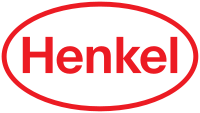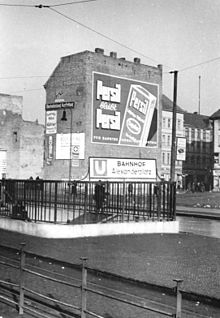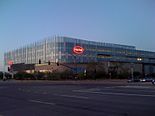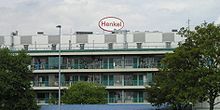- Henkel
-
For other uses, see Henkel (disambiguation).
Henkel AG & Co. KGaA 
Type Kommanditgesellschaft auf Aktien with Aktiengesellschaft as partner with unlimited liability Traded as FWB: HEN, HEN3 Industry Chemicals, consumer products Founded 1876 Headquarters Düsseldorf, Germany Key people Kasper Rorsted (CEO and Chairman of the executive board), Simone Bagel-Trah (Chairman of the supervisory board) Products Personal care, laundry and cleaning products, adhesives and sealants (brands...) Revenue €15.09 billion (2010)[1] Operating income €1.723 billion (2010)[1] Profit €1.118 billion (2010)[1] Total assets €17.53 billion (end 2010)[1] Total equity €7.950 billion (end 2010)[1] Employees 48,140 (average, 2010)[1] Subsidiaries Dial Corporation Website www.henkel.com Henkel AG & Co. KGaA is an multinational company headquartered in Düsseldorf, Germany.
The company operates in three business areas: Home Care (with household cleaning products such as laundry detergent and dishwashing liquid), Personal Care (with beauty and oral care products such as shampoo, toothpaste, hair colorants and shower products like Dial Soap and Right Guard), and Adhesives, Sealants & Surface Treatment for consumer and industrial purposes.
With presence in 125 countries on five continents, Henkel engages in the majority of its business within Europe and North America.
Contents
Brands
It controls leading brands like:
- Persil[1] washing powder, Spee washing powder, Vernel/Silan fabric softener, Somat/Glist dishwasher tablets, Pril washing-up liquid,
- Schwarzkopf haircare (Cosmetics company Hans Schwarzkopf GmbH was acquired by Henkel in 1985. After the integration in 1987 the business sectors brand-name products were assigned to Schwarzkopf & Henkel Cosmetics GmbH, Düsseldorf, and hair salon products to Hans Schwarzkopf GmbH & Co KG (Schwarzkopf Professional), Hamburg, respectively), Schauma shampoo, Fa shower gel and deodorant, Diadermine skin and body care, Dial shower and hand soap and Persil abaya shampoo
- Loctite and UniBond adhesives and sealants, Pritt glue sticks, Polyseamseal caulk, and Plastic Padding chemicals,[2]
Historically, Henkel's most famous brand is Persil, the first commercial laundry detergent. Before that it was only either soap flakes or actual bars of soap.
History
The company was founded in 1876 in Aachen as Henkel & Cie [3] by Fritz Henkel (a 28 year-old merchant who was interested in science) and two more partners. They marketed his first product, "Universalwaschmittel", a universal detergent based on silicate.
n 1878, to take advantage of the better transport links and sales opportunities, Henkel relocated his company to Düsseldorf on the Rhine (its present site). Düsseldorf was the gateway to the Ruhr region, which became the most important industrial area of the German Empire from the 19th century onward. That year, the first German brand-name detergent appeared: Henkel's Bleich-Soda [Bleaching Soda], an affordably-priced product supplied in sturdy paper bags. Made from water-glass and soda, it was the result of Fritz Henkel's own research. The soda was obtained from Matthes & Weber in Duisburg (Henkel bought this company in 1917 and sold it in 1994).
In 1879 Fritz Henkel was entered as the sole owner in the register of companies. Sales of Henkel's Bleaching Soda increased so rapidly that within just one year the rented factory on the Schützenstraße in Düsseldorf was unable to meet the demand. Fritz Henkel decided to build his own factory with a railway link.
In 1883 to improve liquidity and make better use of the Company's travelling sales staff, Fritz Henkel decided to sell merchandise in addition to his detergents. Sales started in 1884. The range included the colorant ultramarine [laundry bluing agent], gloss starch, a liquid cleaning agent, a pomade for cleaning, beef extract, and a hair pomade. Very soon Henkel developed its international presence--in 1886, Henkel opened its first international sales office in Austria. Carl Pathe had gone to Vienna as a representative the year before. In 1893 Henkel established its first business links with England and Italy.
 Henkel mural in Berlin, 1951
Henkel mural in Berlin, 1951
In 1903, Schwarzkopf founded by Hans Schwarzkopf (1874–1921) launched a powder shampoo. Persil came in 1907 as the first “self-acting laundry detergent”.
Henkel has been a family-run business since the beginning. In 1893, Fritz Henkel, Jr. (1875–1930) joined the firm as an apprentice. After receiving commercial training he became his father's right-hand man in commercial matters. He put Henkel's brand-name product business on a sound footing, developed its already successful advertising still further and was responsible for the Company's field service. On July 25, 1904, he became a partner in Henkel, which was transformed into a general commercial partnership. By this time, 110 people were employed at the Holthausen site. On April 25, 1905 Dr. Hugo Henkel (1881–1952), the youngest son of Fritz Henkel, Sr., joined the Company as a chemist. He was in charge of Chemical Products and Technology. Over the years, he laid the foundations of systematic research and introduced advanced technologies and new raw materials. In 1908, he became a personally liable partner in the Company.
In 1912 total production in Düsseldorf-Holthausen rose to 49,890 tons. At 19,750 tons, Persil laundry detergent accounted for 40 percent of this, just five years after its market launch. The number of employees increased by 89 relative to the previous year, resulting in a total workforce of 1,024. Around half were female. A first-aid center was set up in the plant and a full-time nurse was employed. In the previous year Henkel had installed ball fields and play areas to encourage exercise during break times. Female employees could attend the plant's own housekeeping school during the lunch break.
On January 11, 1923, troops from France and Belgium occupied the Rhineland. The occupation made delivery of adhesives from suppliers used for the packaging of Persil unreliable. The disruption caused Henkel to internally manufacture adhesives for its own needs. Henkel found there was a demand for adhesives on the market, and on June 22, 1923, the first adhesive shipment left the plant.[4]
During World War II, foreign civilians and prisoners of war were working for the company. Henkel was part of a large-scale restitution settlement.
 Henkel U.S. headquarters Scottsdale, Arizona
Henkel U.S. headquarters Scottsdale, Arizona
On April 16, 1945 American troops occupied Henkel's Düsseldorf site. On June 5, the British military command in Düsseldorf took over from the Americans. From July 20, the British military government gradually granted permission for the production of adhesives, P3 and water-glass by Henkel, and for soaps and detergents as well as shoe polish by Thompson. In February, 1946, Matthes & Weber in Duisburg was given permission to process available raw materials into soda. On September 20, 1945, five members of the Henkel family and another seven members of the Management Board and the Supervisory Board were interned.
In 1949 the launch of Schauma shampoo by Schwarzkopf marked the start of the most successful German shampoos.
In 1954, Henkel-subsidiary Dreiring launched Fa soap, a new type of toilet soap. From 1970 onward it was joined by a series of Fa deodorants, shower gels and bubble baths, making Fa one of the best known umbrella brands in the toiletry sector.
Pritt, the world's first glue stick, made its debut in 1969. Over the years, other products were introduced under this brand, underlining Henkel's importance in the office and stationery supplies sector. Exports of Pritt began in the same year, eventually making this Henkel's most widespread global brand. Vernel fabric softener and enzyme-based bioactive Persil 70 appeared.
Henkel building in Düsseldorf.
Starting in the 1960s, Henkel has combined organic growth with strategic company acquisitions:
- in 1960 by acquiring Standard Chemical Products, Inc. (known as Henkel Inc from 1971), Henkel entered the USA chemical products market.
- In 1962 Henkel acquired Sichel-Werke AG, Hannover, its main German competitor in the adhesives sector.
- In 1974 Henkel acquired shares in The Clorox Company, USA, to facilitate the production and sale of certain products developed by Henkel for household and bulk consumers (sold in 2004).
- In 1983 Henkel acquired the AOK facial care range from the company von Heyden GmbH and thus strengthened its position in the cosmetics retail trade.
- In 1984 Teroson of Heidelberg (in existence since 1898) was acquired and integrated into Henkel's Adhesives and Surface Technologies business sectors.
- Cosmetics company Hans Schwarzkopf GmbH was acquired by Henkel in 1985
- Later it purchased Loctite in 1987.
- The purchase of The Dial Corporation in 2004 was the biggest acquisition in the history of the company until then: This renowned U.S. personal care and household cleaning products company gave Henkel a strong foothold on the North American market.
- 2004 Henkel also acquired the American cosmetics company Advanced Research Laboratories (ARL), that has developed and marketed hair cosmetics.
- In April 2008 Henkel has taken over from AkzoNobel the Adhesives and Electronic Materials businesses previously owned by National Starch. In 2007, these two business segments of National Starch generated sales of £1.25 billion (about €1.83 billion). The purchase price was £2.7 billion (about €3.7 billion).
On May 5, 2011 Jyothy Laboratories bought 50.97% stake in Henkel India. It has offered to buy 20% more in Henkel India through a compulsory open offer mandated by SEBI norms[5][6]
Henkel Art.Award
In 2002 Henkel CEE[7] launched the Henkel Art Award — a prize for art in 30 countries in Central Eastern Europe and Central Asia. In addition to the monetary prize and presentation of the works of art in Vienna, an exhibition is also organized for the winner in his or her homeland.
Competitors
Henkel's main competitors in its cleaning division are Unilever, Procter & Gamble and Reckitt Benckiser. In its beauty division, its main competitors are Unilever, Procter and Gamble and L'Oréal. In its chemical and adhesive division, it has many competitors, but the main multinational competitors are Bostik and H. B. Fuller.
Note
- ^ In an agreement with Unilever, the Persil brand is only used by Henkel in mainland Europe (with the exception of France), while Unilever only uses the brand in the UK, Ireland, Oceania and other markets.
See also
References
- ^ a b c d e f "Annual Report 2010" (PDF). Henkel. http://annualreport.henkel.com/fileadmin/ONGB10/PDF_EN/Henkel_AR10-english.pdf. Retrieved 24 February 2011.
- ^ Henkel.co.uk
- ^ fundinguniverse.com, Henkel company history http://www.fundinguniverse.com/company-histories/Henkel-KGaA-Company-History.html
- ^ Henkel.com
- ^ Articles.economictimes.indiatimes.com
- ^ Articles.economictimes.indiatimes.com
- ^ Henkel-cee.com
External links
 DAX companies of Germany
DAX companies of GermanyAdidas · Allianz · BASF · Bayer · Beiersdorf · BMW · Commerzbank · Daimler · Deutsche Bank · Deutsche Börse · Deutsche Post · Deutsche Telekom · E.ON · Fresenius · Fresenius Medical Care · HeidelbergCement · Henkel · Infineon Technologies · K+S · Linde · Lufthansa · MAN · Merck · METRO · Munich Re · RWE · SAP · Siemens · ThyssenKrupp · Volkswagen
Categories:- Companies listed on the Frankfurt Stock Exchange
- Companies based in Düsseldorf
- Manufacturing companies of Germany
- Companies established in 1876
- Cosmetics companies
- Chemical companies of Germany
- Henkel brands
- German brands
Wikimedia Foundation. 2010.

